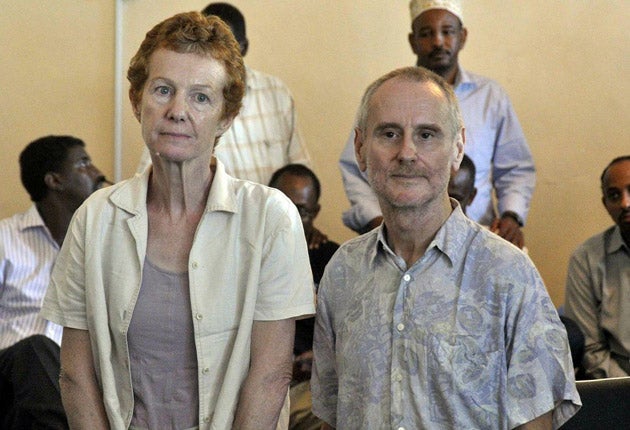Chandlers' joy mixed with grief as they prepare for homecoming

The British yachting couple freed from captivity by pirates in Somalia were preparing to return home yesterday amid personal grief and public controversy over the payment of their ransom.
As Paul Chandler was celebrating his and his wife Rachel's release after 388 days of incarceration, he was told that his father had died in July.
Alfred Chandler, 99, a widower living alone in Dartmouth, Devon, was already weak and in poor health, with his neighbours helping to look after him, when his son met him for the last time before setting off on the sailing trip in autumn last year.
The Chandlers, from Tunbridge Wells in Kent, had said that one of their main worries was that they would not see Alfred Chandler alive again. Paul Chandler had spoken about the cruelty of the kidnap gang in failing to keep him updated about his father's deteriorating medical condition.
However, according to some reports, relatives in the UK deliberately kept the news quiet to spare Mr and Mrs Chandler further mental anguish, while other sources claimed the pirate gang were told about his father's illness in an attempt to appeal to their sense of compassion during negotiations.
The couple spoke briefly yesterday of their trauma. "The worst time was when we had to abandon our home and boat... in the ocean," said Mr Chandler.
His wife added: "Abandoning [our yacht] Lynn Rival when we were taken on board the container ship and brought eventually on shore was the worst time. Another time that was very traumatic was when they decided to separate us. We were really distraught, we were very frightened at that point. We refused to be separated and we were beaten as a result. That was very traumatic."
In London, the Government sought to counter claims that British taxpayers' money had subsidised the Chandlers' ransom, which is believed to have been around £650,000.
The British Government has a stated official policy of not paying for the release of hostages or negotiating with abductors. However, a number of British, Kenyan and Somali sources have stated that UK diplomats had been in indirect contact with people representing the kidnap gang, and a Somali official had claimed that British aid given to the regime in Mogadishu was used to pay part of the ransom.
On 10 March, Britain announced a new aid programme of £5.8m "to help promote peace" in Somalia, according to a press release from the Department for International Development.
This followed a 15-minute meeting at Downing Street two days earlier between the Somali leader Sheikh Sharif Sheikh Ahmed and Gordon Brown. The then British Prime Minister is said to have indicated he wanted the Chandlers' kidnapping resolved by the time of the general election in May. The Government reiterated yesterday that no "substantive concessions" are made to kidnappers, and that the use of aid money for the ransom was denied by Douglas Alexander, the International Development Secretary at the time.
Mr Alexander said: "There was no suggestion, never mind decision, made by either me or the Foreign Secretary, to link these funds to the release of hostages. The long-standing position of successive British governments has been not to make substantive concessions, including ransoms, in return for hostage-taking."
A spokesman for the Department for International Development said: "No part of the UK aid budget has been used to help secure the Chandlers' release, nor to benefit pirates. The British Government does not pay ransoms to hostage-takers."
In a statement, the Chandler family said: "Throughout the protracted discussions with the pirates it has been a difficult task for the family to get across the message that these were two retired people on a sailing trip on a small private yacht, and not part of a major commercial enterprise involving tens of millions of pounds of assets."
But they refused to comment on how the couple's freedom was secured, saying only that common sense had "finally prevailed".
A number of people have stepped forward to claim that they had played a key role in securing the Chandlers' release. The latest one to do so was Dahir Abdullahi Kadiye, a former London minicab driver who claims to have overseen the transfer of hundreds of thousands of pounds to the kidnap gang. Mr Kadiye, 56, from Leytonstone, east London, told Channel 4 News that he took on the job of hostage negotiator six months ago because his children had told him they felt ashamed at school when they saw the Chandlers' appeals for help broadcast on television.
A number of news organisations have made offers to "buy up" the Chandlers' story and the couple will consider their options with their family.
Join our commenting forum
Join thought-provoking conversations, follow other Independent readers and see their replies
Comments
Bookmark popover
Removed from bookmarks